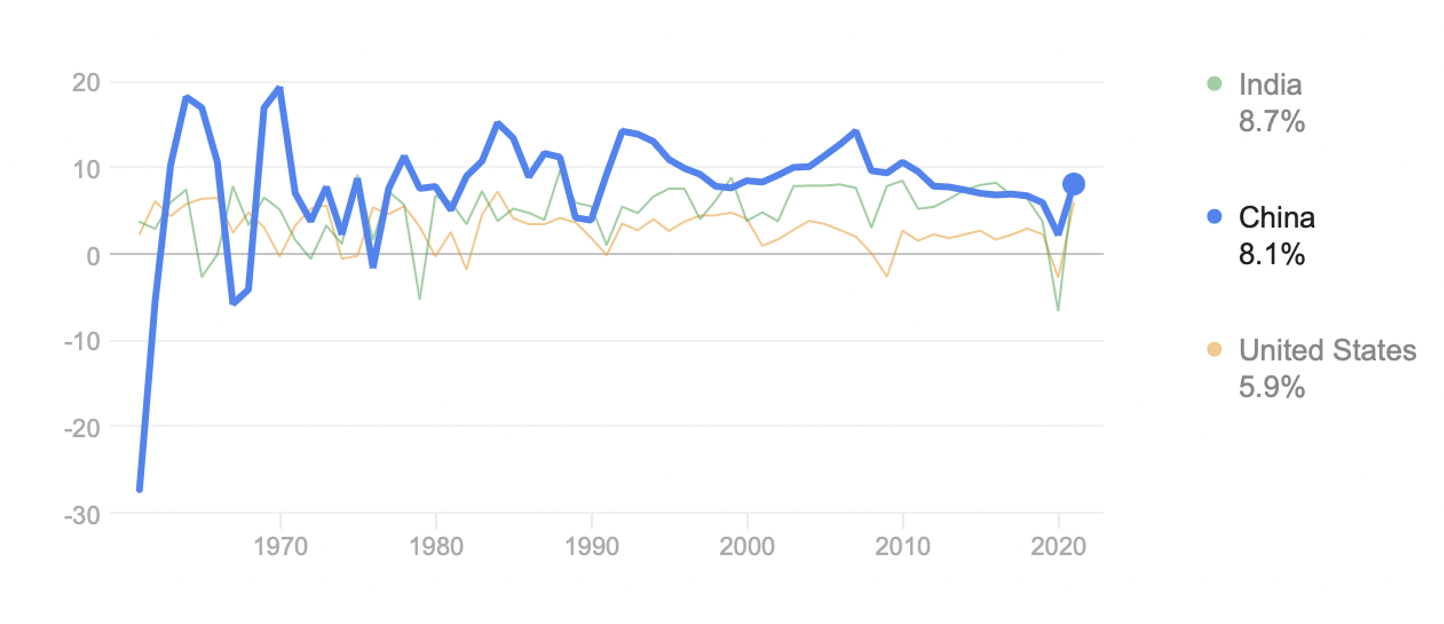

When I listed the many headwinds that threaten both our economy and the inflation we live with, China was targeted as a big risk. And as the Guardian.com reminds us today about Treasurer Jim Chalmers view on our biggest trading partner: “China’s slowdown was ‘the sharpest point of risk’ in the current economic outlook.”
While that could be an exaggeration, it certainly is a pothole in the roads to both economic and stock market recoveries, as well as lower inflation and interest rates.
A stronger China bolsters out exports, and that takes the Oz dollar higher, which then helps us contain inflation imported from more expensive foreign goods and services. As the dollar goes up in value, overseas holidays, cars, and everything we buy from overseas become cheaper.
In turn, this lowers inflation and reduces the need for any more rate rises.
The good news overnight is China is ending its restrictions of trade on Aussie hay. “The federal government says China is clearing the way to resume imports of Australian hay, another step in the improvement of the trading relationship,” reported Daniel Hurst, writing for The Guardian. “But the government will continue to press for the removal of other remaining trade blockages, including tariffs on Australian wine and restrictions on lobster.”
How important are hay exports?
“According to official figures, Australia’s exports of hay and chaff to China were valued at $78m last year, down from $160m in 2020, meaning China was Australia’s third biggest market for the product,” Hurst informs us.
This follows Beijing easing up its trade stops put on timber and barley when the Morrison Government was arm-twisted to support international China-hater and former US President Donald Trump. Much of the trade bans were payback for joining the ‘pile on’ against China encouraged by Mr Trump.
While China does need to be brought to book for its bad behaviour, this country is our most important trading partner and when we play the high and moral social commentator on Beijing’s behaviour, there’s often an economic price to pay.
To understand China’s importance to us, this is what the Department of Foreign Affairs and Trade (DFAT) tells us: “China is Australia's largest trading partner. It buys almost a third of all Australian exports and is the top overseas market for many Australian goods and services. Trade and investment with China is a big part of Australia's future. The Australia-China economic relationship is extensive and growing strongly.”
If you need more convincing about China’s importance, take this in from DFAT: “Trade as a whole is equivalent to 45 per cent of Australian GDP and is directly responsible for one in five Australian jobs. Businesses with foreign investment generate around 40 percent of Australian exports, and foreign investment supports one in ten jobs in Australia.”
I rest my case for Australian governments to do the best work they can with China. This comes as China’s economic growth has been faltering (it’s down to 5.24%) and economists have been wondering if the world’s second biggest economy will be able to bounce back to better growth numbers.
This chart below shows what China has grown at in the past. In 2021, the growth rate was 8.1% but Covid lockdowns have really hit home hard on economic activity.

But Beijing is disputing these negative outlook calls,
with China’s ambassador to Australia, Xiao Qian, telling a Sydney audience: “It should be recognised that, due to the impact of three years of the Covid-19 pandemic, it is normal for China’s economic recovery to be characterised by undulating progress sometimes with twists and turns”.
This is a fair call and he pointed to the most recent economic data that has some promising signs. The ambassador then said the following that needs to be understood: “All countries should join hands to promote an open world economy. No one should engage in beggar-thy-neighbour practices, building ‘a small yard with high fences’, or creating closed and exclusive clubs. Decoupling and chain breaking serve no one’s interest”.
The Trump-China trade war wasn’t good for the global economy but suited home politics in both countries and our economy was a casualty. The lockdowns worldwide helped economies short term because money was spent at home, but it eventually led to inflation as the supply of goods and services choked. What followed was a record rise in rates.
Now we wait to see if central banks have created a recession. Unfortunately, central banks have a history of over-loosening interest rate policy, and they also often raise rates too high.
When a country puts bans on trade, it’s called “beggar thy neighbour” policies because the act of trade restriction undermines economic growth, which is where jobs and income come from.
Let’s hope Beijing plays better economic and social games in the future so our exporters and economy don’t become casualties in the job of making China be a better international citizen. That said, China helping Putin and Russia with the Ukraine war raging makes it hard to embrace our Beijing buddies.